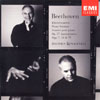Beethoven Piano Sonatas 4, 22, 23 & 25
Kovacevich’s well-recorded, typically powerful playing conveys the music’s urgency and grandeur, though sometimes at the expense of its poetry
View record and artist detailsRecord and Artist Details
Composer or Director: Ludwig van Beethoven
Label: EMI
Magazine Review Date: 2/2001
Media Format: CD or Download
Media Runtime: 70
Mastering:
DDD
Catalogue Number: 556965-2

Tracks:
| Composition | Artist Credit |
|---|---|
| Sonata for Piano No. 4 |
Ludwig van Beethoven, Composer
Ludwig van Beethoven, Composer Stephen Kovacevich, Piano |
| Sonata for Piano No. 22 |
Ludwig van Beethoven, Composer
Ludwig van Beethoven, Composer Stephen Kovacevich, Piano |
| Sonata for Piano No. 23, 'Appassionata' |
Ludwig van Beethoven, Composer
Ludwig van Beethoven, Composer Stephen Kovacevich, Piano |
| Sonata for Piano No. 25 |
Ludwig van Beethoven, Composer
Ludwig van Beethoven, Composer Stephen Kovacevich, Piano |
Author: Stephen Plaistow
The Appassionata comes up first and the E flat Sonata, Op 7, last in the tracking, presumably because the Appassionata never fails to make a bid for the public’s attention, whereas the other, much less celebrated, continues to be one of Beethoven’s best kept secrets. Anyone collecting Kovacevich in his traversal of all the sonatas – this is the seventh CD so far – is not likely to be seriously disapppointed by the latest instalment, though I don’t think it represents him at his finest. The recording is of high quality, warm and true. There is a lot of sound, but that is characteristic of this pianist, and so are the large-scale paragraphing, the strong forward movement, the urgent tone of voice and the grand manner of projection, as if he wanted to be quite sure of reaching us in the back row of the stalls.
The impact is considerable, but if you listen all the way through you may find the full 70 minutes a shade wearing. A little more quiet playing would have been welcome. Kovacevich rarely addresses us intimately, or smiles at us, not even in the little G major Sonata, Op 79, and although you would hardly expect him to in the Appassionata you can end up – in spite of his athletic virtuosity and command – feeling that the richness and poetic power of this great work, as opposed to its high drama, have not been fully conveyed. Why can’t forte just be strong for once, I ask myself, instead of fortissimo, and accents pressure points instead of jabs and whiplash attacks? The best of Kovacevich here to my mind is in the last two movements of the ardent E flat Sonata, Op 7, which are richly coloured according to the harmonic detail and the tonal movement; and he is engaged, too, by the extraordinary rhythmic energy and compression of the two-movement Sonata in F, Op 54, one of Beethoven’s most original creations – a pity, however, that he responds so half-heartedly to the piu allegro on the final page. Splendid piano playing, then, but only intermittently great Beethoven.'
The impact is considerable, but if you listen all the way through you may find the full 70 minutes a shade wearing. A little more quiet playing would have been welcome. Kovacevich rarely addresses us intimately, or smiles at us, not even in the little G major Sonata, Op 79, and although you would hardly expect him to in the Appassionata you can end up – in spite of his athletic virtuosity and command – feeling that the richness and poetic power of this great work, as opposed to its high drama, have not been fully conveyed. Why can’t forte just be strong for once, I ask myself, instead of fortissimo, and accents pressure points instead of jabs and whiplash attacks? The best of Kovacevich here to my mind is in the last two movements of the ardent E flat Sonata, Op 7, which are richly coloured according to the harmonic detail and the tonal movement; and he is engaged, too, by the extraordinary rhythmic energy and compression of the two-movement Sonata in F, Op 54, one of Beethoven’s most original creations – a pity, however, that he responds so half-heartedly to the piu allegro on the final page. Splendid piano playing, then, but only intermittently great Beethoven.'
Discover the world's largest classical music catalogue with Presto Music.

Gramophone Digital Club
- Digital Edition
- Digital Archive
- Reviews Database
- Full website access
From £8.75 / month
Subscribe
Gramophone Full Club
- Print Edition
- Digital Edition
- Digital Archive
- Reviews Database
- Full website access
From £11.00 / month
Subscribe
If you are a library, university or other organisation that would be interested in an institutional subscription to Gramophone please click here for further information.




